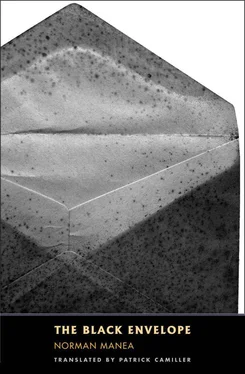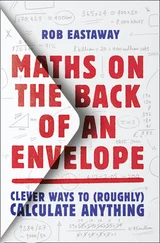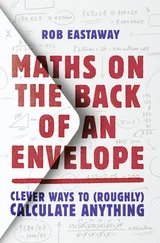That’s about it for the moment. I know Masterkey will keep us informed of any change.
HE DOZED OFF, LOSThimself, then Ira appeared.
Her snow-white face, rising from the collar of a black dress. Her snow-white hands, out of dark billowing sleeves. Scarcely had the words been heard when—
There had to be maximum attention, maximum concentration. How can mere nothings tie you up like that, so that you forget the goal, the line? The secret line of fate, whispered Irina.
Forget fear and boredom, forget the day’s ballast, the humiliating artifices. Let a single secret line accompany you. Not some stupid detail of the day. Nothing else, my little cricket — only the supreme principle. Only the flame, only the stake.
He was attentive, very attentive, too attentive. Neither blinking nor breathing, so as not to disturb the image or to let the words go astray.
But he was dozing again. He gripped the edge of the bench, almost crying from the tension of not blinking lest everything collapse. But the jamming had already begun: the day was already muttering its troubles. How could he silence it? How to ignore it? And the fata morgana is gone; the hypnosis has worn off — it’s all over. Other voices nearby.
But they disappeared. He dozed off again from exhaustion, at peace with the torpor and the sun. He woke again and lost himself again and woke up and again shut his eyes. A movement. A heavy old shadow. It called for attention, maximum attention: someone or something was rustling nearby.
“What are you looking at? Why are you staring like that, young man?” The hoarse voice rushed at him from left and right, from all sides.
He did not blink. He still did not blink. He won’t budge, he won’t give in. Patience, patience, and curiosity and concentration. Indifference, only like this — attention, great attention, common sense, as much as possible. That’s how sleep, dreams, come over you, like a faint. Indifference, insensitivity—
“What do you do in life, eh?” the bass voice returned on an authoritarian note.
“Well,” the answer came.
“Okay, that’s clear. I’m Titian.” The voice continued to left and right, on all sides. Everything grew dimmer, clearer: nothing. Absolutely nothing. Just the intruder rambling on. He could see him at last, sitting beside him on the bench.
“Well, er—” muddled the muddlehead.
The old man really did look like—
“Well — I didn’t quite get what you said.”
“You heard, but you didn’t understand. Well, I’m Titian. That’s right. Titian. You ought to believe your ears, sonny. Am I being too familiar? Maybe you’re not even a sonny boy. Hum, not the right words, eh? My eyesight — what can I do? It’s my age. I’m ninety-nine.”
Big dark eyes, slipping from their whitish sockets. Thin bluish nose. Deeply wrinkled cheeks. A thoughtful, still thoughtful expression on his face. A black felt skullcap concealed his forehead, hair, bald patch — whatever it was. An unkempt yellowing mustache, cracked lower lip. A white bushy beard. Huge, enormous ears.
“I do look like him, don’t I? Well, I am him. I’ve been Titian for some twenty years now. Tiziano through and through! I’m ninety-nine, as I said. Close to death. The great Tiziano is close to death.”
A woolen peasant coat, thick and black, with a nice fur collar from which his shirt was sticking out. His big hairy hands were trembling. Velvet trousers. Around his neck a metal pendant with a seashell. On his bare yellow feet a pair of sneakers.
“Well, you’ve been through a lot.”
“Yes, I’ve done a lot, my boy. A lot of all sorts. I told you, I’m ninety-nine. I deserve a hundred. I deserved it, really I did. Now I’m dying, although I did deserve a hundred. I’m ninety-nine and on my way out. But I come here every day. On foot, from right out in the wilds. On foot, without a walking stick. I don’t need one: I keep walking and don’t get tired. But I haven’t got long to go.”
“Well, but you’re very — how shall I put it? — in really excellent shape.”
“Sure, excellent. The doctor said that as well. A little tubby one, with a glass eye. He hides the gap under his glasses, but there’s no point: he’s got a glass eye. And he’s got quite a sense of humor— which is important with doctors, you know. Jokes are half the cure. I have my doubts about medicine. And that jokey doctor from the loony bin never seems to get anywhere either. I’ve caught it: it’s a bad disease that I’ve caught. Old Titian has been infected by your dirty tricks. Just as he’s getting to a hundred, his time has come. The great Titian is dying! That’s what’s written in the book: Tiziano Vecellio is dying. When you think — Charles V picked my brush up from the floor. A day like today — it was only yesterday. I’d dropped the brush, the Emperor bent over to pick it up. The Emperor! The highest power on earth. But in the presence of Tiziano he recognized he was a mere mortal.”
“Yes, that’s quite something. Etiquette counts for a lot at the court.”
“I wasn’t your scholarly Leonardo. Or your enchanting Raphael, or granite-block Michelangelo. I didn’t respect the rules of composition, I presented unfinished canvases — or so they said. But the color! Well, the color gave them their unity. Intensity — that’s what it’s all about. Did you ever meet Pesaro? Have you heard of him?”
“Well. . er. . what shall I—”
“A patron — that’s what he was. I had dealings with anyone I could. Have you seen the Pesaro family? That painting with the Virgin and saints. The Venetian noble Iacopo Pesaro. In that painting I directed Saint Peter’s and the Madonna’s gaze at the donor. Hmm, we’re crafty all right. Crafty, but artists! You might think I’m just a dirty ass-licker. But to put a flag opposite the Holy Virgin no one is allowed to touch? A mere flag, of cloth and worldly sport. That took a lot of guts, I can tell you. That’s why we are artists. But color! Color is the painter’s impertinence, his virtuosity. Otherwise portraits — you know. Everyone wanted to pose for me, so they’d be immortal.”
“But what about the allegory? The Allegory of Time ,” the dozer’s voice started up. “You painted it ten years ago. You were already at a respectable age.”
“They all wanted a portrait, I’m telling you,” the old man continued. “Do you remember Pope Paul III? I didn’t finish it, unfortunately. I wanted to get one up on Raphael. My Paul was going to be more alive. But I didn’t finish it. Charles the Emperor called me to Rome unexpectedly. Charles summoned me!”
“But what about that Allegory of Time ? Time. The three representations. Prudence. The allegory painted ten years ago,” Tolea could hear his own bored voice saying. “I’ve heard there’s a self-portrait among them. A self-portrait by Titian as an old man, it seems.”
“Look, you’ve dropped an envelope there,” the old man muttered in annoyance.
“You must remember it. The only time you didn’t put your name on the painting. Not even the name of the models, as you used to do with portraits.”
“What’s in the envelope? Why have you hidden it? Love? Scented letters? Oh, how I used to love them, the devils. A long life and long glory also means—”
“There’s no name in the allegory. But what about the Latin motto? Ex praeterito. . praesens prudentur agit. . ni futura actione deturpet. Do you remember? That is: The action of the present starts from the experience of the past. From the past, in other words. It acts with prudence. With pru-dence, you wrote. With prudence, not indifference. The present acts with prudence so as not to prejudice the future. Do you remember? The Allegory of Prudence — that’s the painting. Maybe painted in a spring like this. Were you a prudent man, maestro?”
Читать дальше












